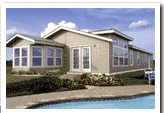
|
How Ready Are You to Buy a Home? Determining Your Dream Home and Finding It! Factory Built Homes Are Worth a Look Purchase Manufactured Homes with FHA Loan How to Buy a Foreclosed Home Pros and Cons of Corner Lots Know the Neighborhood Before You Buy Tune in to an Open House on the Radio Finding a Qualified Broker or Agent Shopping for a Loan and Choosing a Lender How to Improve Your Credit How to Survive the Loan Application Process Making an Offer and Signing Contracts Cancel Your Contract in 3 Days Understanding the Closing/Settlement Process Choosing Home Inpection Professionals Double Check Your New Home - The Walkthrough Know Your Consumer Rights Seniors Have Many Housing Opportunities Preparing for the Big Day -- Relocating Moving Cost-Effective Redecorating Ideas | Factory-Built Homes are Worth a Look | |||||||||||||
Sometimes image is everything. Not long ago, the mobile home evoked images of identical trailers stacked in rows. What a difference a few years makes. Today's manufactured homes are challenging the trailer park stigma. Thanks in part to quality control standards passed in the 1970s, the old trailer park has gradually evolved into the factory-built, luxury community of the year 2000, replete with attached garages, vaulted ceilings, golf courses, and marinas. |  |
Manufactured-home living is no longer a one-size-fits-all proposition. Developers of these homes are taking advantage of lower building costs and recent buying trends to reach a more affluent consumer. The new models range anywhere from nicely appointed cottages to jumbo, ranch-style homes in the 2,500 square foot range. Developers must be doing something right. Shipments of manufactured homes exceeded 375,000 in 1998, up from about 254,000 in 1993. That's about one quarter of all new-construction homes sold.
Unlike a site-built home, a manufactured home is built in a factory and transported by truck to the owner's property for installation. There are three main advantages to keep in mind. First, they're generally cheaper, as much as 40 percent lower than site-built homes. Second, a manufactured home can be ready to move into sooner than a site-built home. Finally, from a quality standpoint, a manufactured home has the added advantage of being built under controlled, factory conditions.
What's the catch? There are distinct drawbacks associated with manufactured homes, as any developer can attest. Some communities have restrictive zoning ordinances. Some jurisdictions actually prohibit manufactured housing while others restrict size and appearance. That can be a problem if you're searching around on your own for a home site, instead of moving into a developer's planned community.
Furthermore, just as site-built homes aren't perfect because they're "new," a manufactured home isn't perfect just because it was built in a factory. You'll need to check the manufacturer's warranty carefully for what it does and does not cover. In addition, you must make sure your installation goes "without a hitch." Although the Department of Housing and Urban Development regulates the design and manufacture of these homes, installation is a different matter. Careless transportation or improper installation can damage a manufactured home, or cause systems to work improperly.
By Cliff McCreedy